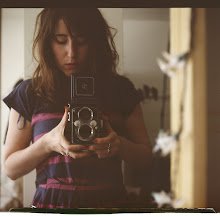The exhibition is an on-going project for Goldberg, exploring and documenting illegal immigrants, war refugees, and displaced people who have been forced to leave their homes due to social and economic devastation.
At first the disparate nature of the exhibition was quite disorientating. Goldberg uses various formats - polaroids, medium format and large format prints, video and various ephemera to explore and (what only I can guess) reflect the fragmented nature of the broken up lives of these people in transit. I instantly found (no pun intended...) the use of polaroid captured an intimacy between subject and photographer. This in itself, seemed to highlight the physical process of interaction between the documenter and the documented. Not only did the words written on the portraits draw me into the reality of the subject's own subjectivity, but the use of polaroid also made me aware of the immediacy and tangibility of the image itself.
One photo that struck me early on was a polaroid of an elderly man who had written on his own portrait: "I make 68 taka [$1] a day and have despair." It completely stopped me in my tracks. Something I would have taken as a striking documentary photograph was now a direct link to another human being and their experience of the world. If I'm honest, at first I felt a little uncomfortable with the annotation on the photographs as I wasn't sure if the subject had written it directly or if it was a post-capture narrative constructed by the photographer (who knows with some people's attempt at the post modern!). As someone who was unaware of Goldberg's methods and previous work - having seen the fragmented nature of how the various formats were exhibited, my cynical brain was unsure if this was just another part of the fragmentation, taking meaning and subverting it through the photographer's own constructed narrative. But as you look through the wealth of images and written accounts (excerpts from Goldberg's travel diary and notes that accompany some of the images) there is no doubting the sincerity and conviction of the work.
I really do urge people to go see it. The photographs are not only powerful in their subject matter and method of documentary, but Goldberg's eye for composition and light is simply stunning.
More info here: http://www.photonet.org.uk/index.php?pxid=956

No comments:
Post a Comment